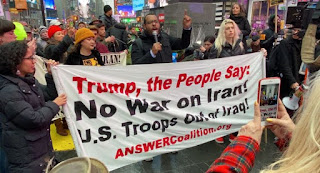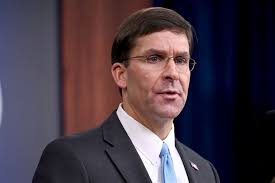Reportedly in an extraordinary session on Sunday, the Iraqi
parliament voted for a resolution requiring the government to order the
withdrawal of US troops from Iraq.
The session came two days after a US drone strike on a
convoy at Baghdad airport which killed Iranian Military Commander Qassem
Soleimani and Iraqi Popular Mobilization Forces (PMF) Deputy Chief Abu Mahdi
al-Muhandis.
“There is no need for the presence of American forces after
defeating Daesh,” said Ammar al-Shibli, a lawmaker and member of the
parliamentary legal committee.
“We have our own armed forces which are capable of
protecting the country,” he said, Reuters reported.
Around 5,000 U.S. troops remain in Iraq, most of them in an
advisory capacity.
During a massive funeral procession for General Soleimani,
the commander of the IRGC Quds Force, and al-Muhandis in Baghdad, al-
Kadhimiya, Karbala and Najaf, hundreds of thousands of angry Iraqi mourners
carried placards demanding an immediate expulsion of “U.S. terrorists” from
their country.
In the face of the Iraqi people’s will, the Iraqi parliament
made a historic test about by voting to expel the U.S. troops.
Expelling Iraqi troops had turned into a “national
demand” after the terrorist attacks on the top Iranian and Iraqi military
commanders.
Following the terrorist attack by the US, Iraqi caretaker
Prime Minister Adel Abdul Mahdi had asked the parliament to take a decision
based on Article 58 of the Iraqi constitution about the “illegal action” of the
US army.
The Prime Minister said the US move was a violation of the
Iraqi sovereignty and an affront to national pride.
He called the US act a dangerous move which will trigger
another devastating war in Iraq and the region.
Since the US terrorist attack, rival political leaders
had been calling for expulsion of US troops from Iraq in an unusual
show of unity among factions.
Hadi al-Amiri, the top candidate to succeed al-Muhandis,
repeated his call for US troops to leave Iraq on Saturday during an elaborate
funeral procession for those killed in the attack.
Iraqi Parliament Speaker Salim al-Jabouri has expressed
anger over the US attack on the military convoy, saying, “What happened around
Baghdad airport was an open violation of the Iraqi territorial sovereignty and
violation of international agreements.”
He added, “Any security and military operation should be
with the agreement of the government.”
Faleh al-Fayad, Iraq’s national security advisor
and chief of Hashd al-Shaabi or PMF), has also said it is the duty of the Iraqi
government and judiciary to respond to the violation of the Iraqi sovereignty.
Also, Abdelkarim Khalaf, spokesman for the Iraqi Armed
Forces has said "these strikes represent a treacherous stab in the
back."






